Emperor of the West Charlemagne
1200 years ago, 28 January 814, died King of the Franks and Emperor of the West Charlemagne. He entered history as one of the founders of the European (Roman-German) civilization and the creators of the first "European Union". Fighting practically all his life, Karl created the Frankish (Western) Empire, which included the territories of modern France, Belgium, Holland, Switzerland, Northern Italy, Western Germany and part of Spain. In addition, Karl entered history as a ruler who played a decisive role in promoting Christianity outside the former Roman Empire (the emperor of the West was considered the heir and successor of the empire's cause). "With fire and sword" baptized the pagans of Central and Northern Europe. It was then that Europe felt the heavy tread of the “onslaught to the East and North. The Slavic civilization of Central and Southern Europe (occupying the territories of modern Germany, Austria, the Czech Republic, Slovakia and the Balkans) faced a terrible enemy, who acted not only with a sword, but also with gold and a lie. The Frankish Empire inherited the ancient strategy of "divide and conquer." Battle has been raging for centuries. Blood and tears flowed in rivers. At the same time, often Slavic tribal alliances collided with each other.
Gradually, part of the Slavs was destroyed (the most passionate), others went east (Varyagi-Rus Rurik), others were assimilated - they became “Austrians”, “Germans”, “Danes”, the fourth - “recoded”, obeyed the Roman matrix. So, the Poles, by adopting the western version of Christianity, became the cruelest enemies of Russia-Russia. Therefore, studying the history of the Frankish empire, the time of Karl's rule, it is necessary not only to admire the iron will of this man (a truly great statesman and commander), but also to remember that this was the cruel enemy of Slavism who laid the foundations of the "onslaught on the East" process.
The beginning of government
It must be said that the foundation of the Frankish empire was actually created by three great rulers, the predecessor of Charles: Chlodvig, Karl Martell (Hammer) and Pepin the Short. Clovis laid the foundations of statehood and union with the Christian church; Karl Martell created the social and military base of the monarchy - designed the feudal system, based on "noble estates" (beneficiaries), stopped the onslaught of the Islamic project - the battle of Poitiers; Pepin the Short officially became king, ending the period of "lazy kings", the last representative of the Merovingian dynasty - Childeric III - was sent to the monastery (his son Theodoric was also sent to the monastery). Pepin paid the Pope for his support in changing the dynasty by pacifying the Lombards twice and donating the lands they occupied to Rome. As a result, a secular state popes. There was a complete reorientation of Rome from East to West. The Union of Carolingians with Rome opened a wide road to the future of Europe. The foundation of a European (Roman-German) civilization was laid.
The exact date of birth of Karl is unknown. It can be 742, 744, 747 or 748 year. His father was the first king of the Carolingian dynasty - Pepin the Short. Mother - Bertrada Laon (Bertha Big Foot). The father began to accustom the boy to state affairs early. Karl took part in court meetings, diplomatic affairs, Pipin's aquatic campaigns. When his father passed away in the 768 year, Karl was already an adult. Based on the date of birth in 742, he was 26 years old.
Before his death, Pipin divided the kingdom between two sons. Carloman received the Rhone River basin and the upper reaches of the Loire, Seine, Meuse and Rhine. Carl got the territory from Aquitaine to Thuringia, along the coast, the middle reaches of the Rhine and Main. Both brothers were proclaimed kings of the Franks. Carl - in Noyon (Noyon), Carloman - in Soissons.
The relationship between the brothers did not exist. The agreement between them was maintained with the greatest difficulty and could at any time turn into a collision. This was not slow to take advantage of the enemies of the Franks. The newly conquered Aquitanians lifted their heads; the tribes of Britons and Saxons threatened blows from the west and east; the king of the Langobards, Desiderius, became a great threat (the kingdom of the Lombards, the “long beards,” occupied the territories of Northern and partly Central Italy). Desiderius united most of Italy and dreamed of subjugating the whole peninsula. He possessed considerable resources and a large army. Desiderius violated the agreement concluded with Pipin, and began to oppress the Pope. He gave one daughter for the Duke Benevento (one of the autonomous Lombard duchies, which differed little in meaning and size from the kingdom, the second - Spoleto), the second - for the Duke of Bavaria. This strengthened its political position. Bavaria was considered part of the Frankish kingdom, but although the duke of Tassilon repeatedly gave the vassal oath to Pepin, he looked upon them as a formality. The Duke ruled Bavaria as an independent sovereign. The Bavaro-Langobard Union threatened the Frankish state.
Karl did not notice these threats in the early years of his reign. He enjoyed power. He traveled a lot on his numerous estates, hunted, feasted, gifted monasteries. True, he could not help but respond to the revolt of Aquitaine. In 769, one of the lords from the southwest, Gunold, raised the uprising of Western Aquitans and Gascon Basques. Karl called Brother Carloman for help, but he gave a categorical refusal to participate in the campaign. The rebellion was suppressed easily. Gunold fled to Gascony. However, the Duke of Gascon, whom Gunold hoped to support, betrayed him to Charles, and he himself expressed submission. Karl visited many local monasteries and abbeys, forging relationships with local clergy.
The first period of Karl’s rule was also marked by the great influence of his mother Bertrada. The widowed queen was a powerful and ambitious woman, and the young king was very inexperienced. Under Pipin, the queen was deprived of serious power because of a spat that nearly led to divorce, and now she was trying to catch up. She played the role of a conciliator between sons. In 770, she traveled to Rome, held talks with Desiderius, and brought with her youngest daughter, Desideratus, who became Karl's wife. She forced Carl to abandon his first wife, Khimiltrudy.
However, the peacemaking policy of the mother in a year ended in complete collapse. Too strong contradictions existed between the main centers of power. The Lombard king decided that from the north he was now not in danger, he increased the pressure on Rome, began to take from the Pope one area after another. Pope Stephen III asked for help from Carloman and Karl, but did not receive it. He had to submit to the king of the Lombards. The Frankish power was rapidly losing ground in Italy.
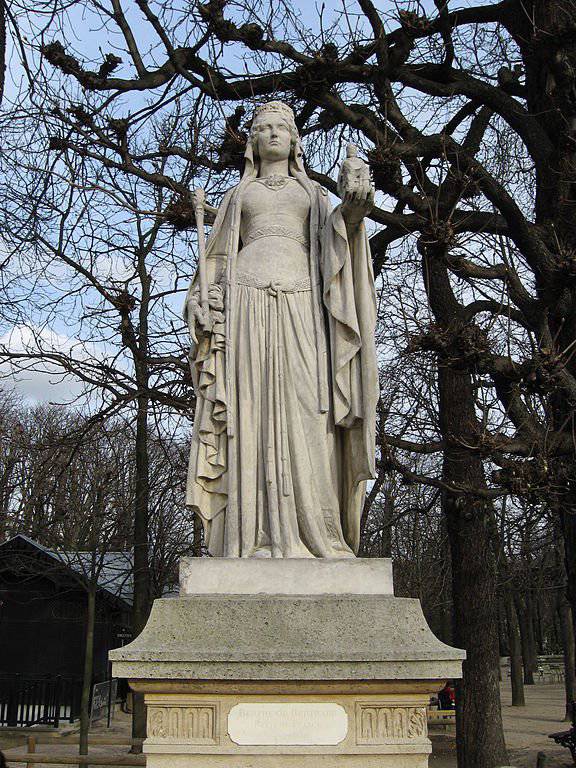
The statue of Bertrada Laonskaya in the Luxembourg Garden in Paris.
The reunification of power and the defeat of the Lombards
Here Karl dramatically changed his policy. The period of indecision and following the advice of the mother is over. He broke off relations with Desiderata, sent her to his father. Relations with Carloman were going to break and war. Suddenly in December 771, Carloman dies. Karl immediately laid a hand on his inheritance and became the only king of the Franks.
In 772, the era of the great wars of Charles begins. From now on, his life will be filled with campaigns, invasions, sieges, pacification of insurrections and military gatherings. Almost every spring (usually May) - a military gathering near the site of the planned operation. Then in the summer - a hike or even two. Often conceived operation on one front was interrupted due to the threat in another direction. Then the dissolution of the army on the "winter apartments", rest in one of the royal estates. Preparing for a new operation.
Karl became a really great commander and strategist. Quite often, the threat existed from several directions at once, there was a feeling of defeat and chaos. However, the king has always been able to unravel the most complex knot and get acceptable results. Even outwardly, the king was a real hero. The exhumation of Karl’s grave confirmed the correctness of the description of a mighty and tall warrior: the length of the skeleton was 192, see. He knew how to grasp the essence of the situation literally on the fly, often only one appearance led to the desired result.
Constant wars demanded great human resources. Warriors were needed to hold the occupied territories. Therefore, Karl continued the tradition of his father and grandfather. On the one hand, the military reform of Karl Hammer was continued and expanded. The stable core of the army consisted of feudal beneficiaries. For regular service, they received land ownership (feudal benefices) from state funds. On the other hand, there was an old system of appeals, preserved from the time of the Merovingians. Every year, bishops, earls, large landowners of various areas received orders to appear with their people, horsemen and on foot, armed and equipped, at the appointed time at the gathering place. For being late, a high fine was imposed, for evasion - a penalty. The general mobilization of the regional militia was rarely carried out. Usually limited to the collection of troops of a particular area, which is bordered on the areas of hostilities. Usually, five or six free men were supposed to equip and equip one fighter. This system was quite effective, as expressed in the expansion of the Frankish power.
The Lombards war was advancing. King Desiderius was beside himself with anger. Insult from Charles demanded urgent revenge. For a start, he “cleared out” the Frankish party, supporters of the alliance with Karl. He accepted the wife and son Carloman who fled. Then Desiderius demanded that the Pope should anoint the sons of Carloman to the Frankish throne. But here the spit found on the stone. Submissive Pope Stephen III was replaced by the authoritarian and strong-willed Adrian. The new dad answered with restraint, demanded guarantees. The Lombard King did not give guarantees, began to devastate papal possessions again. The pope closed in Rome and sent ambassador Carl, asking to protect the "Holy Roman Church."
Karl reacted this time with lightning speed. In June 773, the troops began preparations for the march. To calm the Prolangobard group, which did not want war, Karl tried to get on with Desiderius two more times. However, he refused to negotiate. Lombards closed and strengthened the passes in the Alps. Then Karl decided to conduct a workaround. On secret paths, the Frankish detachment was able to reach the rear of the enemy. Desiderius, frightened by the encirclement, did not accept the battle and hid in his capital Pavia. In addition, the Pope was able to sow the seeds of treason in the ranks of the Lombards, weakening their determination to resist. Frankish troops with the battle pursued the enemy, taking possession of numerous cities of Lombardy on the way. Part of the army was left to besiege Pavia. The city was a strong fortress. Pavia has already withstood two sieges of Pepin the Short's army. Desiderius hoped to wait out the invasion of the Franks. Karl in February 774, led the rest of the troops to Verona, the second most important city of the kingdom. Verona did not resist for long and fell. The city was captured by the family Carloman. True, the son of Desiderius - Adelhis, who led the defense of Verona - was able to escape to Constantinople. Later, he cherished plans for the Lombard throne with the help of Empress Irina (the first autocrat woman in the history of the empire).
Karl as a victor entered Rome. He promised Adrian I new possessions (this promise was later not fulfilled). The capital of the Lombards for some time kept. But the city was not ready for a long siege, the townspeople were exhausted by hunger and hardship. Many representatives of the nobility did not sympathize with the plans of their king. In early June, Desiderius realized that his game was lost, and with his family left the city to submit to Carl. Karl, together with the new Queen Hildegard, solemnly entered the fortress and distributed the Lombard treasury to the soldiers. Desiderius and his wife were taken to the Frankish kingdom, forced to get a monastic vow. What happened to the family Carloman, is unknown. Karl became the king of the Lombards and the "Roman patrician." Lombard kingdom ceased to exist. Karl began to introduce the Frankish system in Lombardy and united the Frankish Kingdom and Lombardy into one state.
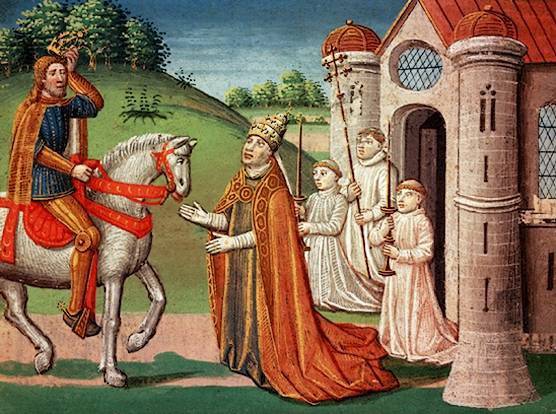
Charlemagne and Pope Adrian I.
However, the Italian wars did not end there. Hardly had Charles left the country, as the dukes Friul and Spoleto, counting on the help of Byzantium, decided to seize Rome and restore the power of the Lombards on the peninsula. Their plot was supported by Adelhiz and the Duke of Benevento. Karl, engaged in the war with the Saxons, could not immediately return to Italy. In 776, he crossed the Alps again. The rebellious cities obeyed. The Duke Friuli died, Adelhiz fled again.
Carl decided to bring order to Italy. He died down again in Saxony, at the end of 780, he arrived in Rome, where his young son Pepin was named king of the Lombards. Naturally, he performed this role formally. The new king had a court, with which he lived in Pavia, then in Verona. The old laws of the Lombards were kept. Local nobility retained part of government posts. The real power was the appointees of Charles: in the Friul and Spoleto the dukes were imprisoned, in the rest of the regions - the counts. As a result, more than one important decision could not pass without Karl’s consent. In Northern and Central Italy, Karl received full power.
However, there still remained Arechis II, the mighty duke of Benevento. He was appointed the Duke of Desiderius, who married Arehisa to his daughter Adelperge. After the defeat of Lombardy, the Arechis decided that he was an independent ruler and appropriated the title of "prince". In case of war with the Franks, a powerful fortress was built in Salerno, which became the second capital of Arechis. Duke Benevento continued cooperation with Adelhiz and sought support from Byzantium. Excessive ambition killed the duke.
The Frankish king, who was promptly informed by the Pope of the plans of his enemies, decided to stop the activities of the enemy. In 787, Charles's troops entered the duchy. Arehis was forced to take the vassal oath, and began to pay tribute. The second son of Arehis, Grimoald, was held hostage by Karl. In the 788 year, the Arechis and his first son Romuald died unexpectedly (before he died, the Arechis organized a new conspiracy against Charles). Grimoald was allowed to return to Benevento. He recognized the Frankish domination, maintaining autonomy in exchange for the protection of the peninsula from the Byzantine Empire. Grimoald remained loyal to Karl, and when Adelhiz with the help of the Byzantines tried to return Italy under the power of the Lombards, he spoke out against him. Adelhiz and the Byzantines were defeated. Italy remained under the rule of Charles.
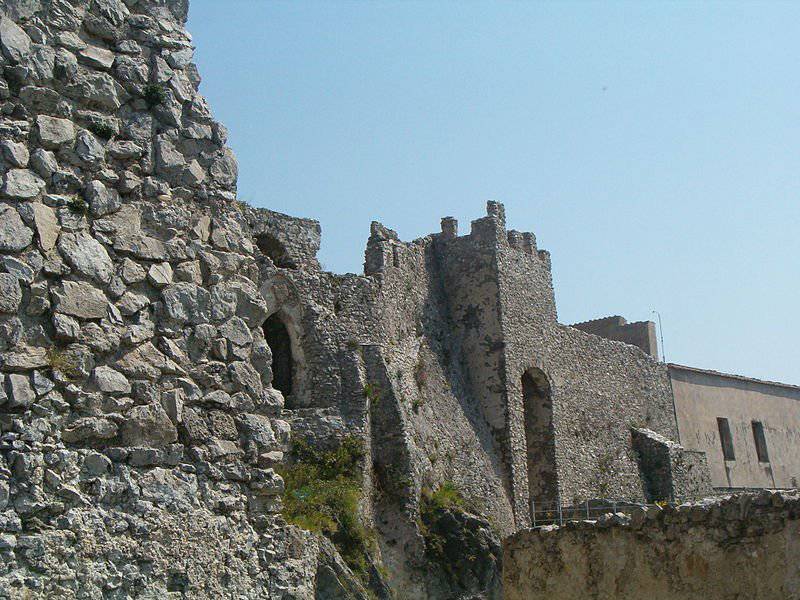
Fortress of Arechisa II in Salerno
Submission to Bavaria
Suddenly, the rapid defeat of Lombardy put Bavaria in a difficult position. Bavarian-Langobard coalition ceased to exist. For several years, the Bavarian Duke Tassilon III managed to pursue a flexible policy. On the one hand, he tried not to irritate the suzerain, the victorious Frankish king. He resorted to the mediation of the Pope and renewed the oath given to Pipin. On the other hand, he reigned as a king, did not bring auxiliary troops to Karl, ceased to appear at the May gatherings, conducted his own seimas of secular and spiritual ranks. His wife, Liutgard, the daughter of the overthrown King of Lombard, burned with revenge and spun intrigues, urging on her husband. The Bavarian Duke colluded with the opponents of Charles in Italy, Byzantium, and even the Avar tribal alliance that settled on the Middle Danube.
Karl guessed about the intrigues of his enemies, but, being busy with the Saxon war, for the time being he let the Bavarian ruler down. Only in the 787 year, having temporarily solved problems in Italy and Saxony, did Carl decide to strike at Bavaria. Karl gathers troops against Tassilon. The Bavarian ruler is trying to gain time. Two top hierarchs from Bavaria arrive in Rome and ask Pope Hadrian for mediation. The Pope willingly agreed. Karl, in turn, expresses readiness for peace if Tassilon takes the oath and signs the corresponding document. However, the envoys declare that they are not authorized to give such promises and leave the “Eternal City”. The enraged Pope anathematizes the Bavarian duke and blesses the king of the Franks to fight the disobedient vassal.
Karl convenes the General Diet in Worms in July and demands the immediate appearance of Tassilon. The Bavarian ruler evades. Then the Frankish king advances to Bavaria. It turns out that not all vassals of the Bavarian duke are ready to fight with Karl. Some immediately take the side of the king of the Franks, others hesitate. Realizing that in this situation a direct collision is disastrous, Tassilon is to Carl with rich gifts. Tassilon renews the oath of oath and leaves hostages, including his son.
However, this did not save the duke. In 788, Tassilon is summoned to a Diet at Ingelheim. He was opposed by the Pope, the Bavarian clergy with the Archbishop of Salzburg at the head, and many representatives of the Bavarian nobility. Tassilon was forced to confess to treason, the Franks unanimously sentenced him to death. However, Karl “generously” replaced the penalty with monastic vows. Tassilon, his wife and children were trimmed and imprisoned forever in a monastery.
Thus, Bavaria was completely subordinate to the Frankish kingdom. Her autonomy was abolished. The king handed it over to his county governors. Simultaneously with Bavaria, the Slavic lands previously annexed by the Bavarians — Carinthia and Krajna — moved to the Frankish kingdom. The power of Charlemagne gained access to the Balkans and was able to release all her strength to fight the Saxons.
I must say that Karl still had to return to the "Bavarian question." Having carried out a “cleansing” of Bavaria from local nobility, who did not immediately express submission, the lord of the Franks decided to organize an indicative performance in order to finally crush Bavaria. In June, 794 of the year during the General Seym in Frankfurt, Tassilon was brought from the monastery, where he was imprisoned and forced to undergo additional humiliation. The unfortunate monk was forced to re-publicly repent and beg for forgiveness, and also repeatedly reject any claims to the throne of Bavaria.
To be continued ...
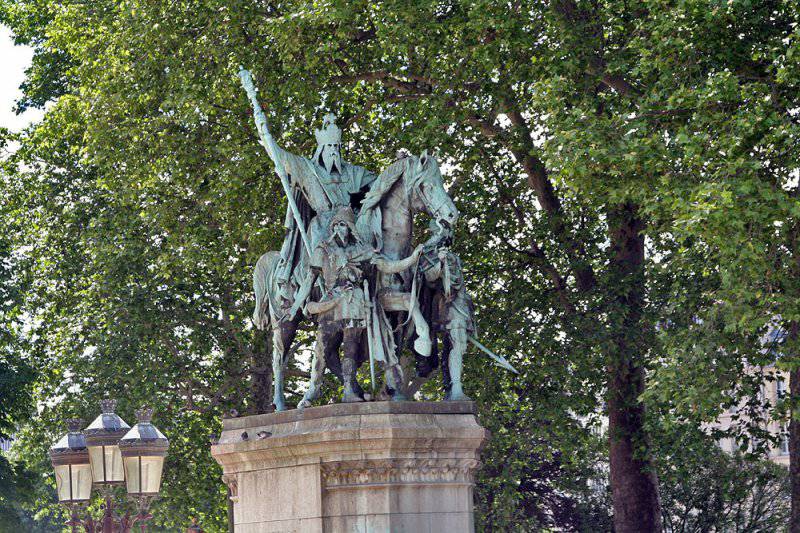
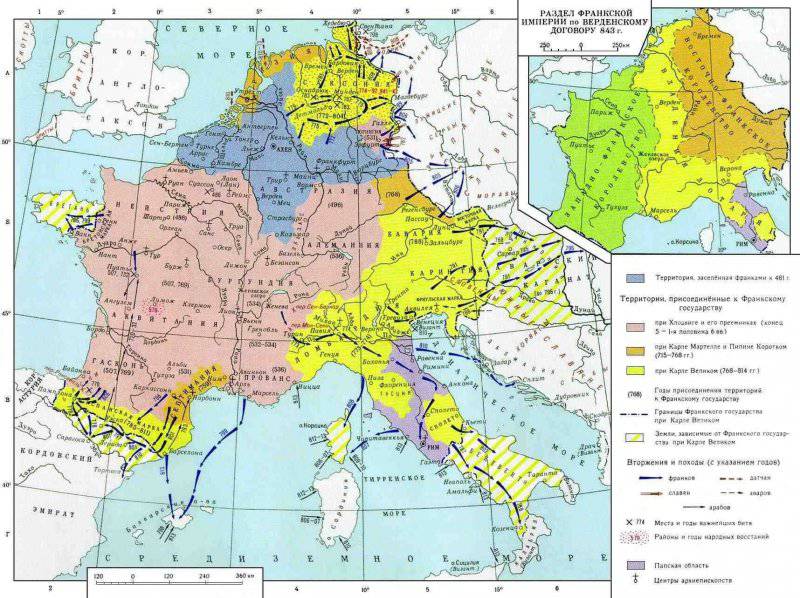
Information